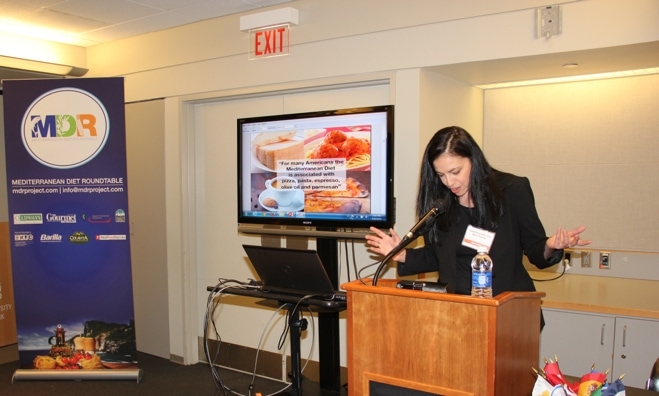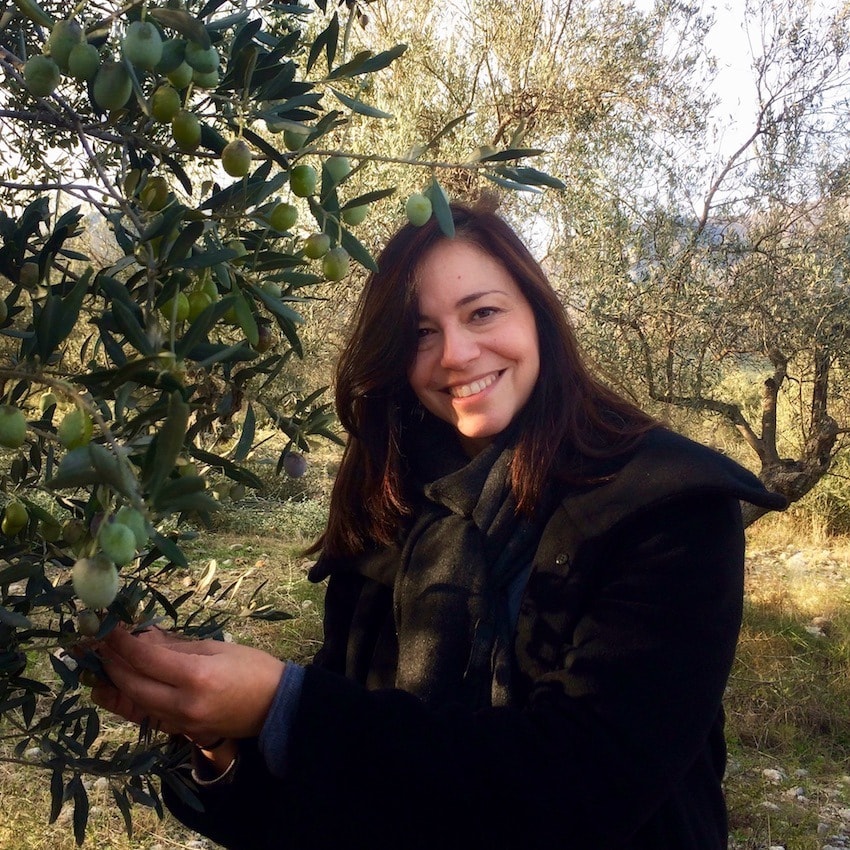Welcome to Olive Tomato!
Hi! I am Elena Paravantes, MS, RD and I am here to inspire you to lead a happier, healthier lifestyle and learn more about the Real Mediterranean Diet.

If you are looking for tried and trusted information, you’re at the right place. OliveTomato (my website) is the most credible and trusted source for the Mediterranean Diet. Why? Because here you get first-hand information, backed by science.
You see I’m not only a Registered Dietitian Nutritionist with over 25 years of experience, an author, a mother of two, but someone with deep Greek roots; the Mediterranean Diet is more than just my profession—it’s part of who I am. I’ve been living this way of eating my whole life, and I’ve seen how it can truly nourish both body and soul. Having spent half my life in the U.S., I am proof that you can follow this diet from anywhere in the world.
Come along with me as we explore the amazing benefits of the Mediterranean Diet! I’ll share its nutritional value, delicious recipes, and helpful cooking tips, along with the latest research and news. Together, we’ll find simple and enjoyable ways to bring Greek and Mediterranean flavors into your everyday meals and lifestyle. Let’s make healthy living both easy and tasty!
WHAT YOU CAN EXPECT FROM ME THAT YOU WON’T GET FROM OTHER “MEDITERRANEAN DIET EXPERTS”
Elena Paravantes is THE Authority on the Mediterranean Diet
The Mediterranean diet was virtually unknown in the U.S. a few decades ago and today it has become one of the most popular diets worldwide. Mediterranean diet experts and books are popping up everywhere with many descriptions and recipes that resembled very little to the food my mother, aunts and grandmothers cooked in Greece. There was and is plenty of misinformation about the diet.
Don’t settle for generic advice, get the information about the Mediterranean Diet from those who know.
With that in mind, I felt that it was time to clear up misconceptions and misunderstandings that have been circulating for years. Here I provide true, easy to follow information and make the diet relevant today and applicable to the modern way of life without sacrificing its true nature.
What you can expect from me is:
- Guidance on how to follow a real Mediterranean diet based on the prototype of the Mediterranean Diet
- Authentic Greek and Mediterranean recipes, not westernized versions
- Mediterranean lifestyle advice based on lifelong experiences
- Nutritionist approved recipes that follow the principles of the Mediterranean Diet
- Credible and scientifically sound information about the Mediterranean diet
WHAT OTHERS ARE SAYING
“Thank you so much for making my family healthier! Thank you so much for making simple greek food so accessible! You are doing a truly important work by giving people the culinary tools they need to become healthier. You accompanied a profound change in my lifestyle and for this, you have all my gratitude. In a way, you have become a part of my family: when I talk about Elena, my wife knows it is you I am refering to.” -SL
“I adore your recipes and website. I have so many favorites… You have been such an important presence in my life since my family cholesterol gene kicked in two years ago and I delved into real Mediterranean cooking.” -C
“Thank you for your marvelous website. Using your basic advice, I have completely changed our way of eating at home. I find your approach so do-able..not heaps of complicated recipes just a sort of lifestyle template to follow.” -GD
“Our doctor suggested keeping it simple and to switch to a Mediterranean diet. He ended up having a triple heart bypass last August but his amazing recovery was due to the fact he had lost 60 pounds in the 8 months leading to his operation simply by following the Mediterranean diet and your manifesto which was placed on our fridge.” -KB
“I just wanted to let you know how much I enjoy your blog and how informative it has been for me. I have tried a lot of eating plans, but this is by far the best. I have lost 25 pounds and never feel deprived. It is also very easy to eat on this plan even if your are on a budget.” -CS

And the Formal Resume
Elena Paravantes, MS, RD is an award winning Registered Dietitian, Nutritionist, Writer and an authority on the Mediterranean Diet. Elena earned her Bachelor of Science in Human Nutrition and Dietetics and her Bachelor of Liberal Arts and Sciences in Psychology from the University of Illinois at Chicago. She is a Registered Dietitian by the U.S. Commission on Dietetic Registration (CDR). She holds has a Master’s Degree of Science in Health Management. She has been active in the field of food and nutrition for 25 years as a clinical dietitian, food and nutrition consultant, writer, teacher and lecturer, both in the U.S. and in Greece. Elena firmly believes in the wide-ranging health benefits of the Mediterranean Diet and is committed to educating the public about the wholesome food plan she grew up with through her writing, teaching and lecturing.

Elena developed the Food and Nutrition sections for the Greek editions of Men’s Health and Prevention as Food & Nutrition Editor, establishing them with her work for over 8 years. She is a former professor of nutrition at the American College of Greece and the Health Editor for Olive Oil Times. She is also founder of the Greek language website Greekdiet.gr, dedicated to promoting the traditional Mediterranean lifestyle, while exploring the rich landscape of Greek cuisine, wellness, and gastronomy. Elena provides consulting services on the Mediterranean diet and food for companies, writes for several U.S. and Greek media outlets and blogs for Huffington Post. Her interviews and articles have been published in many publications including CNN, Prevention, Men’s Health, Women’s Health, US News and World Report, Shape, Fitness, Parade, Chowhound, Salon, Oldways, Fox News, Today’s Dietitian, Food and Nutrition Magazine and NPR. As well as Greek publications such as Vima, Eleftherotypia, Vimagazino, VimaGourmet, Athinorama, Iatronet and Madame Figaro. She is the lead author of the chapter on Greek Culture for the Academy of Nutrition and Dietetics publication Cultural Competency for Nutrition Professionals.
Elena has collaborated with a number of organizations including Loyola University, Yale University, University of Missouri, University, Louisiana State University, American College of Greece, Pierce College, Aramark, Mediterranean Diet Roundtable, American University of Madaba-Jordan, Celestyal Cruises, Lambraki Research Foundation.

An active member in the international nutrition community, Elena is a former President of the American Overseas Dietetic Association, and has been on the Board of Directors for over 4 years. She is the official representative of the American Dietetic Association in Greece. She is a member of the Hellenic Dietetic Associations, the Union of Nutritionists and Dietitians of Greece and the Academy of Nutrition and Dietetics (former American Dietetic Association), The International Association of Culinary Professionals, Food and Culinary Professionals Practice group and Slow Food International. She has been awarded the Outstanding Dietitian of the Year award and Recognized Country Representative of the Year award by the American Overseas Dietetic Association. Elena is the former Greek delegate for the European Federation of the Association of Dietitians (EFAD), and Media Representative for the American Overseas Dietetic Association.
Elena lives with her husband and her two sons, and divides her time between Chicago and Athens.
To view her complete CV visit here.
My Story
My story starts off in a Chicago suburb, where my mom would spend hours on end in the kitchen cooking Greek and only Greek food. At school while the other kids had bologna and cheese sandwiches, we had pastichio (a Greek type of lasagna), she never made toll house chocolate chip cookies like my best friends mom, instead we had to eat melomakarona, Greek honey and walnut cookies. And when our mother did decide to cook an American recipe, she’d always manage to sneak in that ubiquitous “Greek element”, hamburger patties with a sprinkle of oregano and lemon, cookies with olive oil… you get the picture. Thanks to mom, I basically was raised on the Mediterranean Diet even though we lived so far away from Greece, that was at the heart of this healthy way of eating.
As a child my life included yearly 3 month trips to Greece where I spent time with my grandparents, relatives and friends experiencing the Greek lifestyle and the Greek diet at it natural environment. When I was 11 I moved to Greece, and even then (the 80’s), most Greeks were eating meals with seasonal produce, a little bit of meat, and children were not eating junk food with the exception of an occasional ice cream in the summer. Returning back to the U.S. I started my studies in nutrition.
I invite you to try my tips and recipes, read the articles and stories, stay up to date on the science behind the Mediterranean Diet, and of course, leave comments and suggestions.
Elena
Copyright Policy
© Olive Tomato and Elena Paravantes. Unauthorized use and/or duplication of this material without express and written permission from this blog’s author is strictly prohibited. Excerpts and links may be used, provided that full and clear credit is given with appropriate and specific direction to the original content.

Do you have a recipe for Greek Fried cheese (Saganaki) ? Would very much appreciate it. Thank you
Yes! Here it is: https://www.olivetomato.com/saganaki-greek-fried-cheese/
Hi Elena, I truly hope you see this and are able to respond. I’m trying to lose weight with the Mediterranean diet. I’m a newbie. I’m a planner and was hoping you can point me in the right direction of a 30 day meal plan. Also, my husband has kidney failure (born with small kidneys) and is on dialysis waiting for transplant. Do you recommend this diet for him? He’s limited with liquids and potassium. Your expertise is much appreciated! Thank you
Hi ! I have and LOVE the cookbook. On page 89, the Crustless Savory Zucchini and Feta Pie, which step does the mixture of eggs, yogurt, olive oil and flour get put somewhere? Thank you!
Hello, Elena,
I’m a subscriber to your newsletter and so appreciate all that you share with your readers.
You may have heard this before, but I feel that I need more guidance with this diet as I cannot eat wheat (or corn) and so many recipes call for wheat-based ingredients.
I have not found any other way to contact you. Thank you so much for reading this.
My copy of your book just arrived. As an Australian of Greek Heritage who grew up with these simple recipes, it’s wonderful to have them all collated in a lovely and well-presented book. So authentic. I have a vast collection of other books purporting similar, but modern cooks have overcomplicated what at its heart is simple and wholesome meals with seasonal ingredients. I lived in Greece for 5.5 years before moving now to Switzerland – and now with your book, I feel I am back in Greece and or with my beloved parents.
I really can’t wait until you decide to print another book, Volume 2 as you have so many additional recipes on your website. Thank you for your brilliance and your humility in sharing your expertise.
Thank you so much for your kind words Despina!
Your recipe for Crustless Savory Zucchini and Feta Pie on page 89 of the Mediterranean Diet Cookbook instructs one to combine eggs, Greek yogurt, olive oil and flour. However, it doesn’t explain what to do with this mixture. Can you clarify?
I bought The Mediterranean Diet cookbook for Beginners about a month ago and I can’t tell you how much my husband and I are enjoying it!
I’ll try not to be to “windy” about it but I have to tell you it has made a great impact on our eating habits and our relationship.
I hate to cook and I hate even more that I’m “expected” to cook just because I’m the woman. So needless to say dinner time has been a sore subject in our home for a while.
After discussing how poorly we’d been eating and how we’re both starting to become overweight, my husband says “what about the Mediterranean diet?” So I searched for a cookbook that seemed like a good one to start the journey with. And here we are!
Next… we made a pact that BOTH of us will do the cooking together; which has created a whole new bond and lifestyle of eating for us that we’re really enjoying. We’ve made so many of the recipes in this book and just get so much enjoyment out of preparing them and enjoying them together.
Hey Elena,
How would one approach the Mediterranean diet if training for hypertrophy?
I’m in no way a bodybuilder, but I am trying to build muscle. Recommended daily protein intake is between 80–100g for my weight. It’s next to impossible to get that much protein from vegetables and legumes alone. Would you rather increase the amount of fish consumed, or try and eat even more legumes, nuts, and cheese, supplement with whey, or what else?
I understand this is going a little bit outside of the traditional mediterranean diet, but I’m trying to strike a balance between a healthier approach to food and meeting fitness goals.
First in many cases protein needs are overestimated even for those lifting weights, I would work with a Registered Dietitian if you have not done so already to assess your protein needs based on your activity, weight and goals, as fitness coaches do not have nutrition expertise.
You can get protein from foods that are part of the Mediterranean diet such as eggs, fish, seeds, nuts and nut butters. In my book for example the average protein per day ranges about 65 g protein for a 1700 calorie level. Supplementing with extra fish, nut butters, eggs, nuts will easily get you to 80 g goal.
Because of a food intolerance I can only eat tomatoes in any form at the most twice a week. Can I skip those dishes?
You can omit them, but try and include other vegetables in their place.
I was wondering if you’d mind answering a question about milk. You don’t seem to like using milk is there a reason why? Is it because of the fast content and calorie count? Isn’t milk supposed to be goood for you? Thanks.
Hi Richard, Traditionally milk was not consumed in the Mediterranean diet, dairy is consumed mainly in the form of yogurt and cheese. Having said that from a nutritional standpoint, it does not necessarily have more fat or calories than cheese or yogurt, but it is liquid calories which are not as filling.
What are the rate of people in Greece getting psoriasis? I m curious as I m suffering from psoriasis and told to refrain from nightshades which include tomatoes but med dishes are all bathed in tomato juices ..any good advice for this?
Kalispera, Elena.
I have been reading and enjoying your website for almost a year now and I purchased your book this past summer. I love the recipes and tips and everything you share about the Mediterranean diet and lifestyle. So just wanted to share a warm, heartfelt thank you!
I’m very excited as my husband and I are visiting Greece for the first time later this month. I know the food, the scenery, the people and the culture will all be amazing experiences.
Kind regards,
Elizabeth
Thank you Elizabeth! Happy you are enjoying the site and book! Have a wonderful trip, Greece especially the villages in the mountains are beautiful this time of year.
Hello Elena: I have purchased your cookbook and love it. However I went to get a recipe for beans on page 55 (end of second chapter), and realize that the cookbook I purchased is missing pages 54-55. Can you provide a cookbook with all pages, or even these pages on their own. Thank you.
Hi Judith, Happy you are enjoying the book. Pages 54-55 are the opening pages of the chapter, so there are no recipes on those pages.
The index references “Beans, 22, 55
I believe this is what Judith is referring to
Hi Elena,
Thanks for all the great info. I have been following your advice for about 6 years now. I have a question regarding muscle growth and the mediterannean diet. How does one maintain the Mediterannean diet and also build significant muscle at the same time?
Hi Caleb, To build muscle you have increase not only protein but total calories and carbs. So, adding some good carbs as well as protein which can be a combination of plant protein (nuts, beans, nut butters) and animal protein (eggs, seafood, chicken) in line with a Mediterranean diet.
Hi Elena,
Someone is telling me that your recipes for certain items made with phyllo dough aren’t authentically Mediterranean Diet because phyllo dough isn’t made with whole wheat flour. Is that true?
Hi Jackie, In the traditional Mediterranean diet not everything was made with whole wheat flour, that is a misconception. Phyllo is very much part of the Mediterranean diet and cuisine. We use it to make the numerous vegetable pies such as spanakopita (spinach pie), kolokithopita (zucchini pe) etc.
Trying to get your book through Amazon as a UK resident, order cancelled by Amazon as they say there is an issue, is this the only way to get your book please?
Hi Kim,
Sorry about that. According to the publisher, the book will be available on October 26th in the UK, you can check other places to buy it (in the UK) here: https://www.dk.com/uk/book/9781465497673-the-mediterranean-diet-cookbook-for-beginners/